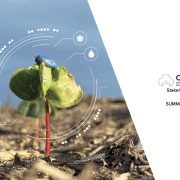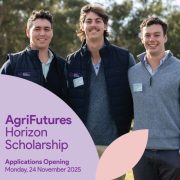Agronomist Kate Lumber is the cotton industry's 2025 Nuffield Farming Scholarship recipient, supported by CRDC and Cotton Australia.
Announced at the annual Nuffield Farming conference yesterday, Kate will study ways Australia’s cotton industry can use water more efficiently to help strengthen resilience in a changing climate.
Kate is an equity partner of Poole Ag Consulting, based in Moree in northern NSW. She is one of five agronomists working at the independent consultancy business that services the cotton, grains, grazing and citrus industries, with a mix of corporate and family farming clients.
Her client base has evolved to become more cotton focused, predominately in irrigated farming systems, however she also consults on mixed broadacre farming enterprises.
Her study topic is centred around growing cotton in limited water scenarios and gaining a better understanding of manipulating cotton physiology and the farming system to grow reliable semi-irrigated crops.
Long-term profitability and resilience are priorities for cotton growers across Australia, where irrigation water reliability varies considerably from season to season.
“Moving forward we must adapt to a changing climate and maintain productivity with fewer inputs,” Kate said.
“As a result, improvements to the semi-irrigated cotton production system to maximise return per megalitre of water and maintaining productivity and profitability in low water years is of great interest.”
Kate is keen to travel to Texas and California to see farming systems that implement limited water irrigation and manipulate growth to manage water use efficiency, as well as countries like Brazil, Greece, Argentina, Turkey and Egypt that typically produce ‘rain grown’ cotton.
Her study topic strongly aligns with CRDC’s commitment to grow the sustainable future of cotton through innovation with impact detailed in our strategic plan, Clever Cotton.
“To ensure long-term profitability and resilience the industry must adapt to a changing climate and maintain productivity with fewer inputs.
“Farming systems constraints such as water, agronomy and climate change will require improved efficiency and adaptive thinking around plant physiology and growing systems.”



